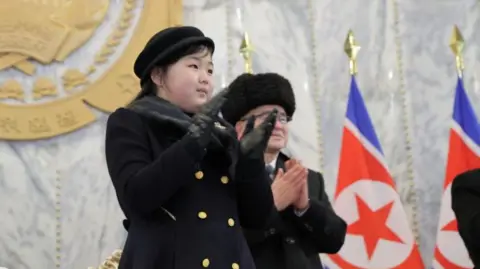The leader of the controversial Unification Church has denied allegations that her organisation bribed South Korea's former first lady with luxury gifts in exchange for business favours.
Han Hak-ja flatly rejected claims that she directed the bribery when confronted by reporters as she emerged from nine hours of questioning at the prosecutor's office.
No... Why would I do that? said the 82-year-old widow of the church's founder Moon Sun-myung, who had to be supported by assistants as she walked.
Former first lady Kim Keon Hee, the wife of ousted President Yoon Suk Yeol, is accused of accepting two Chanel bags and a diamond necklace, together worth 80 million won ($57,900; £42,500), from the church.
Kim was indicated last month for various charges, including bribery and stock manipulation, which she denies. Her arrest marked the first time that both a former president and former first lady have been jailed in South Korea.
Yoon was detained in January to face trial over a failed martial law bid last year that plunged the country into chaos.
On Wednesday, Han pinned the blame on a former church official, saying the official acted on his own in offering Kim those gifts. The official has since been arrested.
Her appearance comes after she refused the special prosecutor's summons thrice. I was in pain after [heart] surgery, she said.
An ambulance was put on standby while she was being interrogated, Reuters reported citing the special prosecutor's office.
On Wednesday, authorities arrested conservative lawmaker Kweon Seong-dong, who is also accused of receiving 100 million won in bribes from the church. Kweon, once seen as a close confidante of Yoon, denied the allegation.
The Unification Church, known formally as The Family Federation for World Peace and Unification, was founded in South Korea in the 1950s by Moon Sun-myung, who proclaimed himself the messiah.
The church is best known for holding mass weddings involving thousands of couples, some of whom would have only recently been matched by the church.
Critics have described the group as cult-like. Lawyers have accused it of coercing devotees, known colloquially as Moonies after its founder, to donate large sums of money.
The Unification Church had come under the spotlight in Japan after the assassination of the country's former leader Shinzo Abe. The alleged assassin blamed the group for bankrupting his family and held a grievance against Abe for allegedly promoting it.
The group is banned in parts of the world, including Singapore and more recently, Japan.
Han Hak-ja flatly rejected claims that she directed the bribery when confronted by reporters as she emerged from nine hours of questioning at the prosecutor's office.
No... Why would I do that? said the 82-year-old widow of the church's founder Moon Sun-myung, who had to be supported by assistants as she walked.
Former first lady Kim Keon Hee, the wife of ousted President Yoon Suk Yeol, is accused of accepting two Chanel bags and a diamond necklace, together worth 80 million won ($57,900; £42,500), from the church.
Kim was indicated last month for various charges, including bribery and stock manipulation, which she denies. Her arrest marked the first time that both a former president and former first lady have been jailed in South Korea.
Yoon was detained in January to face trial over a failed martial law bid last year that plunged the country into chaos.
On Wednesday, Han pinned the blame on a former church official, saying the official acted on his own in offering Kim those gifts. The official has since been arrested.
Her appearance comes after she refused the special prosecutor's summons thrice. I was in pain after [heart] surgery, she said.
An ambulance was put on standby while she was being interrogated, Reuters reported citing the special prosecutor's office.
On Wednesday, authorities arrested conservative lawmaker Kweon Seong-dong, who is also accused of receiving 100 million won in bribes from the church. Kweon, once seen as a close confidante of Yoon, denied the allegation.
The Unification Church, known formally as The Family Federation for World Peace and Unification, was founded in South Korea in the 1950s by Moon Sun-myung, who proclaimed himself the messiah.
The church is best known for holding mass weddings involving thousands of couples, some of whom would have only recently been matched by the church.
Critics have described the group as cult-like. Lawyers have accused it of coercing devotees, known colloquially as Moonies after its founder, to donate large sums of money.
The Unification Church had come under the spotlight in Japan after the assassination of the country's former leader Shinzo Abe. The alleged assassin blamed the group for bankrupting his family and held a grievance against Abe for allegedly promoting it.
The group is banned in parts of the world, including Singapore and more recently, Japan.



















